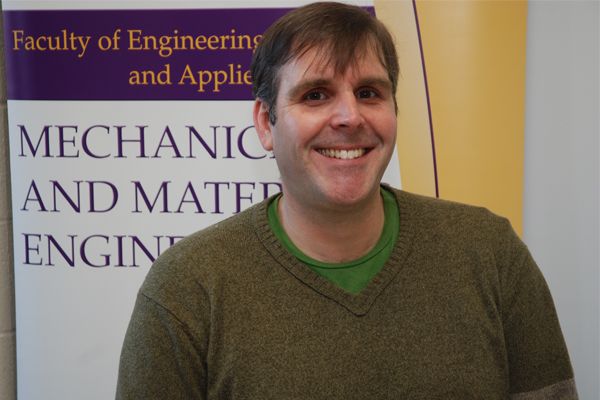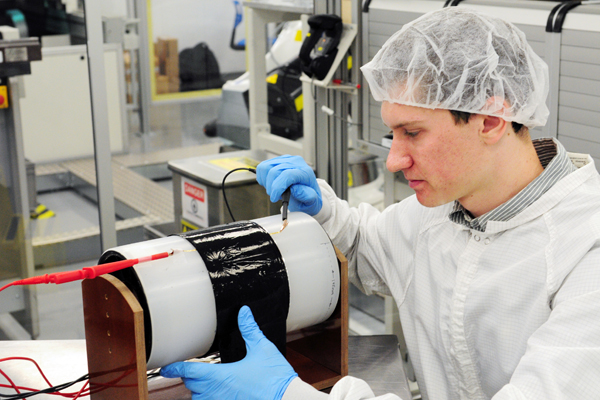Powered by collaboration
July 14, 2016
Share
When Mercedes-Benz was looking for help to improve its fuel cell manufacturing process, the company turned to Jon Pharoah, an engineering professor at Queen’s with more than 20 years of research experience in this field.

“For decades we’ve been researching these devices – how to make them better, how to make them more robust, less costly – and now, there’s a whole new slew of problems when it comes to mass manufacturing,” says Dr. Pharoah, who served as director of the former Queen’s-RMC Fuel Cell Research Centre (FCRC). “When manufacturing fuel cells on a commercial scale, we need to worry about using all the material so that nothing is wasted, that the devices are built to the right tolerances and that they’re made as inexpensive as possible.”
Dr. Pharoah and his team were approached by Mercedes-Benz to help solve an issue faced during mass production of fuel cells. The polymeric material that composes the core of the cell requires water to function, which it draws from the air. When the relative humidity changes, the material can shrink or expand – causing serious quality control issues in a manufacturing setting. Similar to wood used in construction or flooring, the material must be allowed to acclimate before manufacturing. As all of the fuel cell components must be stored and manufactured in a clean room, the manufacturer was looking for ways to shorten the acclimation time and reduce the volume of inventory necessary.

In a series of experiments, Dr. Pharoah and his team tested means of speeding up the acclimatization process, controlling for a wide range of factors. His team has already sent two mechanical engineering master’s students to the manufacturing facility in British Columbia to test the methods on the polymeric material on a larger scale. These on-site projects were funded though the Accelerate program offered by a Mitacs, a national, not-for-profit organization that supports applied and industrial research by providing funding for research internship programs with private sector organizations across the country.
Dr. Pharoah says the collaboration with Mercedes-Benz presented some interesting challenges and required the researchers to look at issues they had not considered in the past.
“We have really thought about the devices, but more from the perspective of making the best possible widget and not the widget that’s easiest to manufacture. It’s a new focus area and there are many manufacturing issues we need to tackle,” he says. “Ultimately, this is the way we’re going to have clean vehicles. This is an incredibly important area for combatting climate change and it’s nice to be working with a company that’s trying to get these out the door and into the hands of consumers.”
Dr. Pharoah and his team continue to refine their acclimation technique, with a new method showing promise in the manufacturing environment. The lab recently sent another student to the manufacturing centre on a Mitacs Accelerate internship to test the polymeric material being used in actual fuel cells.
“Queen’s is delighted to be working with Mercedes-Benz, and to provide our expertise in fuel cell research to solve pressing issues that stand in the way of commercializing this technology,” says Dr. Steven Liss, Vice-Principal (Research). “By improving how Mercedes-Benz manufactures fuel cells for its vehicles, Dr. Pharoah and his team are helping take a crucial step towards a more environmentally friendly future.”
Queen’s distinguishes itself as one of the leading research-intensive institutions in Canada. The mission is to advance research excellence, leadership and innovation, as well as enhance Queen’s impact at a national and international level. Through undertaking leading-edge research, Queen’s is addressing many of the world’s greatest challenges, and developing innovative ideas and technological advances brought about by discoveries in a variety of disciplines.